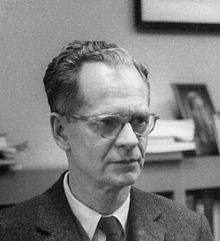
Back بورهوس فريدريك سكينر Arabic بورهوس فريدريك سكينر ARZ বি. এফ. স্কিনাৰ Assamese Burrhus Frederic Skinner AST Burres Frederik Skinner Azerbaijani بیاف اسکینر AZB Берэс Фрэдэрык Скінер Byelorussian Бъръс Фредерик Скинър Bulgarian Burrhus Frederic Skinner Catalan Burrhus Frederic Skinner Czech
Burrhus Frederic Skinner | |
|---|---|
 | |
| Born | March 20, 1904 |
| Died | August 18, 1990 (aged 86) |
| Nationality | American |
| Alma mater | Hamilton College Harvard University |
| Known for | Behavior analysis Operant conditioning Radical behaviorism Verbal Behavior Operant conditioning chamber |
| Scientific career | |
| Fields | Psychologist |
| Institutions | University of Minnesota Indiana University Harvard University |
| Influences | Charles Darwin Ivan Pavlov Ernst Mach Jacques Loeb |
Burrhus Frederic Skinner (March 20, 1904 – August 18, 1990) was a leading American psychologist and author.
Skinner was the leading behaviorist in psychology; he built on the work of John B. Watson, and added the idea of operant conditioning. These two American psychologists paid no attention to mental states and 'thinking' (terms they thought were unscientific), but dealt only with visible behaviors. Skinner's work had effects on education (programmed learning) and on behavior therapy for various psychological problems. He was the Edgar Pierce Professor of Psychology at Harvard University from 1958 until his retirement in 1974, and then Emeritus Professor until 1990.[1]
Skinner was also a social philosopher who wanted to change society, and wrote a eutopian novel,[2] in which the science of human behavior is used to eliminate poverty, sexual oppression, government as we know it, and create a lifestyle without war.[3] He wrote poetry,[4] and three volumes of autobiography.
- ↑ "Burrhus Frederick Skinner (1904–1990) Swenson, Christa 1999". Archived from the original on 2007-04-04. Retrieved 2008-10-16.
- ↑ B.F. Skinner 1948. Walden Two.
- ↑ Skinner B.F. (1972). Beyond freedom and dignity. New York: Vintage Books. ISBN 0-553-14372-7. OCLC 34263003.
- ↑ B.F. Skinner 1970. On 'having' a poem talks about the poem, its publication, and contains the poem and a reply to it as well. Real Audio Archived 2007-06-16 at the Wayback Machine mp3 Ogg